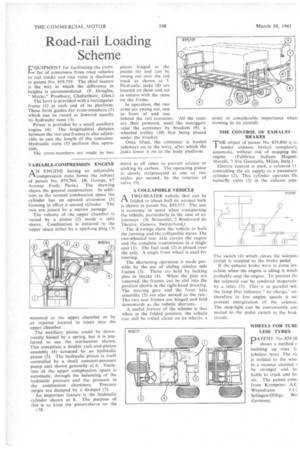Road-rail Loading Scheme
Page 96

If you've noticed an error in this article please click here to report it so we can fix it.
EQUIPMENT for facilitating the transfer fer of containers from road vehicles to rail trucks and vice versa is disclosed in patent No. 859,759. The chief feature is the way in which the difference in heights is accommodated. (F. Douglas, " Morar," Prestbury, Cheltenham, Glos.)
The lorry is provided with a rectangular frame (1) at each end of its platform. These form guides for cross-members (2) which can be raised or lowered equally by hydraulic rams (3).
Power is provided by a small auxiliary engine (4). The longitudinal distance between the two end frames is also adjustable to suit the length of the container. Hydraulic rams (5) perform this operation.
The cross-members are made in two pieces hinged at the points (6) and can be swung out over the rail truck as shown at 7. Hydraulic jacks (8) are located on these and act in unison with the rams on the frame.
In operation, the two arms are swung out, one in front of and one behind the rail container. All the rams are then powered, until the outriggers raise the container by brackets (9), a wheeled trolley (10) first being placed under the bracket.
Once lifted, the container is hauled sideways on to the lorry, after which the jacks lower it on to the body platform. point of considerable importance when stowing in an aircraft.












































































































































